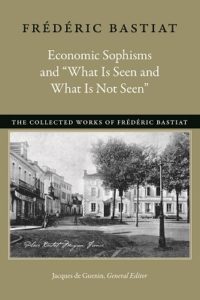Economic Sophisms
By Frédéric Bastiat
Frédéric Bastiat (1801-1850) was a French economist, statesman, and author. He was the leader of the free-trade movement in France from its inception in 1840 until his untimely death in 1850. The first 45 years of his life were spent in preparation for five tremendously productive years writing in favor of freedom. Bastiat was the founder of the weekly newspaper
Le Libre Échange, a contributor to numerous periodicals, and the author of sundry pamphlets and speeches dealing with the pressing issues of his day. Most of his writing was done in the years directly before and after the Revolution of 1848—a time when France was rapidly embracing socialism. As a deputy in the Legislative Assembly, Bastiat fought valiantly for the private property order, but unfortunately the majority of his colleagues chose to ignore him. Frédéric Bastiat remains one of the great champions of freedom whose writings retain their relevance as we continue to confront the old adversary.
Translator/Editor
Arthur Goddard, trans., trans.
First Pub. Date
1845
Publisher
Irvington-on-Hudson, NY: The Foundation for Economic Education, Inc.
Pub. Date
1996
Comments
Introduction by Henry Hazlitt
Copyright
The text of this edition is under copyright
- About the Author
- Preface to the English-Language Edition, by Arthur Goddard
- Introduction, by Henry Hazlitt
- S.1, Author's Introduction to the French Edition
- S.1, Ch.1, Abundance and Scarcity
- S.1, Ch.2, Obstacle and Cause
- S.1, Ch.3, Effort and Result
- S.1, Ch.4, Equalizing the Conditions of Production
- S.1, Ch.5, Our Products Are Burdened with Taxes
- S.1, Ch.6, The Balance of Trade
- S.1, Ch.7, A Petition
- S.1, Ch.8, Differential Tariffs
- S.1, Ch.9, An Immense Discovery
- S.1, Ch.10, Reciprocity
- S.1, Ch.11, Money Prices
- S.1, Ch.12, Does Protectionism Raise Wage Rates
- S.1, Ch.13, Theory and Practice
- S.1, Ch.14, Conflict of Principles
- S.1, Ch.15, Reciprocity Again
- S.1, Ch.16, Obstructed Rivers as Advocates for the Protectionists
- S.1, Ch.17, A Negative Railroad
- S.1, Ch.18, There Are No Absolute Principles
- S.1, Ch.19, National Independence
- S.1, Ch.20, Human vs. Mechanical Labor and Domestic vs. Foreign Labor
- S.1, Ch.21, Raw Materials
- S.1, Ch.22, Metaphors
- S.1, Ch.23, Conclusion
- S.2, Ch.1, The Physiology of Plunder
- S.2, Ch.2, Two Systems of Ethics
- S.2, Ch.3, The Two Hatchets
- S.2, Ch.4, Subordinate Labor Council
- S.2, Ch.5, High Prices and Low Prices
- S.2, Ch.6, To Artisans and Laborers
- S.2, Ch.7, A Chinese Tale
- S.2, Ch.8, Post Hoc, Ergo Propter Hoc
- S.2, Ch.9, Robbery by Subsidy
- S.2, Ch.10, The Tax Collector
- S.2, Ch.11, The Utopian
- S.2, Ch.12, Salt, the Postal Service, and the Tariff
- S.2, Ch.13, Protectionism, or the Three Aldermen
- S.2, Ch.14, Something Else
- S.2, Ch.15, The Little Arsenal of the Freetrader
- S.2, Ch.16, The Right Hand and the Left
- S.2, Ch.17, Domination through Industrial Superiority
Differential Tariffs
First Series, Chapter 8
An impoverished farmer of the Gironde
48* had lovingly tended a vine slip. After much fatigue and toil he finally had the good fortune to harvest enough grapes from it to make a cask of wine, and he forgot that each drop of this precious nectar had cost his brow a drop of sweat. “I shall sell it,” he told his wife, “and with the price I shall buy enough material to enable you to furnish a trousseau for our daughter.”
The honest peasant took his cask of wine to the nearest town, and there he met a Belgian and an Englishman. The Belgian said to him: “Give me your cask of wine, and I will give you fifteen parcels of yarn in exchange.”
The Englishman said: “Give me your wine, and I will give you twenty parcels of yarn; for we English spin it at lower cost than the Belgians.”
But a customs officer who was there said: “My good man, trade with the Belgian, if you wish, but my orders are to keep you from trading with the Englishman.”
“What!” exclaimed the countryman. “You want me to be content with fifteen parcels of yarn from Brussels, when I could have twenty from Manchester?”
“Certainly; do you not see that France would lose if you received twenty parcels instead of fifteen?”
“I find that hard to understand,” said the vineyardist.
“And I find it hard to explain,” replied the customs official; “but it is a fact; for all our deputies, cabinet ministers, and journalists agree that the more a nation receives in exchange for a given quantity of its products, the poorer it becomes.”
The farmer had to make his bargain with the Belgian. The farmer’s daughter got only three-quarters of her trousseau, and these good people are still wondering how it happens that a person is ruined by receiving four parcels of yarn instead of three, and why a person is richer with three dozen towels than with four dozen.
First Series, Chapter 8
First Series, Chapter 10
The Coach and the Fly (Le Coche et la mouche): “Over a sandy, hilly, and difficult road, / Exposed to the sun on all sides / Six strong horses were drawing a coach.”—TRANSLATOR.]
First Series, Chapter 11
Du Système impôt fondé sur les principes d’économie politique.—TRANSLATOR.]
infra, Second Series, chap. 5, and
Economic Harmonies, chap. 4.—EDITOR.]
First Series, Chapter 12
Economic Harmonies, chap. 14.—EDITOR.]
First Series, Chapter 13

